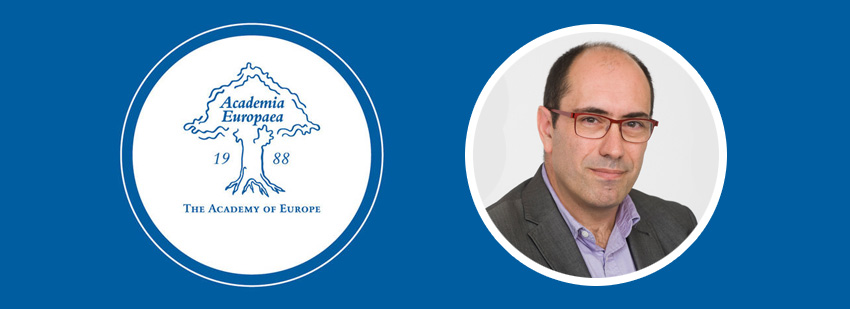In July this year, ICN2 Director Pablo Ordejon was invited to join the Academia Europaea, an organisation that brings together eminent European scientists and scholars from the full range of academic disciplines for the advancement of science and science education.

Founded in 1988, the Academia Europaea is the only Europe-wide academy made up of individual scientists and scholars, rather than institutions. By invitation only, members are elected following exhaustive peer review and scrutiny, drawn from across the entire European continent. Active membership currently stands at around 4000, including 72 Nobel Laureates. The non-profit organisation exists to promote excellence in all branches of scholarly and scientific knowledge and ensure it is taught and applied to the benefit of society at large.
Having been invited in July this year, ICN2 Director Pablo Ordejon, leader of the Theory and Simulation Group, was formally accepted to the academy this week. One of just 119 Spanish members, he joins the Physics and Engineering Section.
Pablo Ordejon has been a tenured researcher at the Spanish National Research Council (CSIC) since 1999. Before this, he spent three years in the United States as a postdoctoral research associate at the University of Illinois Urbana-Champaign, before returning to Spain as an assistant professor at the University of Oviedo. In 1999 he joined the Institute of Materials Science of Barcelona (ICMAB), where he remained until moving across to the former CSIC Nanoscience and Nanotechnology Research Centre (CIN2). He has been director of the Catalan Institute of Nanoscience and Nanotechnology (ICN2) since its creation in 2012.
One of the principal investigators of the MaX Center of Excellence, a European initiative at the forefront of high-performance and high throughput computing technologies, his current research interests include electronic transport in nanoscale devices and surface electronic processes, among many others. He has published over 190 scientific articles (and counting), which have so far been cited over 22,000 times. He is also one of the original creators of the SIESTA code, a tool to perform electronic structure calculations and simulations of the dynamics of molecules and solids used all over the world. He is also a co-founder of the spinoff SIMUNE, which provides computer simulation services to companies developing innovative and cutting-edge technology based on the properties of materials at the atomic scale. Under his direction, the ICN2 has been awarded the Severo Ochoa Centre of Excellence accreditation by the Spanish Ministry of Education, Industry and Competitiveness (2014), and become a founding member of the Barcelona Institute of Science and Technology (2015).

